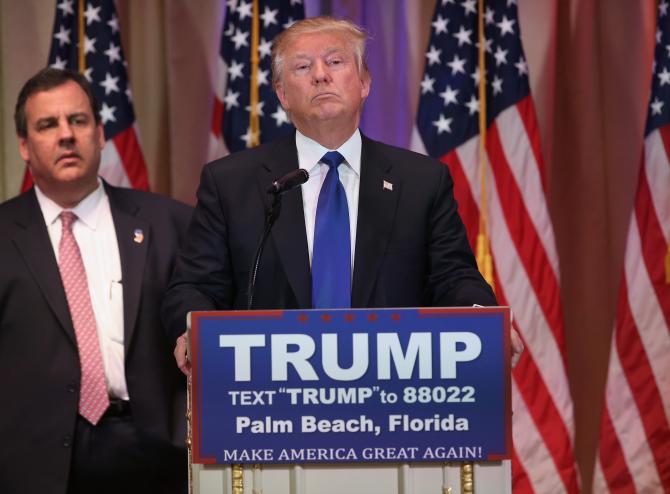[ad_1]

GOP presidential front-runner Donald Trump, flanked by Republican New Jersey Gov. Chris Christie (left), holds press conference in Palm Beach, Fla., on Super Tuesday, March 1, 2016.
John Moore/Getty Images
African-American voters are the biggest story coming out of Super Tuesday to the surprise of many in both parties. Republican turnout was higher than Democratic turnout in just about every state, but the numbers in two places, Georgia and Virginia, are particularly striking.
In both states, African-American turnout in the Republican primaries jumped by historic numbers. In Georgia, turnout in the GOP primary jumped from just 3 percent African American in 2012 to 7 percent in 2016. That’s an increase of more than 100 percent. In Virginia, black turnout jumped from 2 percent in 2012 to 9 percent in 2016, a more than 400 percent increase. This is the equivalent of the GOP black audience going from backyard-concert-sized to a capacity crowd at New York’s Madison Square Garden in just one election. Now, everyone from Marco Rubio to Hillary Clinton and, of course, Donald Trump wants to know why.
The answer is a lot trickier than most politicians realize.
| African American Voter Turnout in GOP Primaries | |||
|---|---|---|---|
| 2008 | 2012 | 2016 | |
| Virginia | 3% | 2% | 9% |
| Georgia | 2% | 3% | 7% |
The Republican Party would like you to believe that this jump in turnout is a result of its extensive outreach programs in the African-American community. Republican National Committee Chair Reince Priebus has made it a point to reach out to African-American voters in traditionally Democratic states and urban areas to expand the party.
But while there has been some success in this regard, it’s difficult to imagine black voters are suddenly going to come out in mass to support Republican candidates in two Southern states based on an outreach program that just started a few years ago. Urban radio and black newspapers are still pretty much ignored by candidates for the Republican nomination, and the last time most Republican candidates set foot in a Southern black church was to pay respects after last summer’s Mother Emanuel church shootings in South Carolina.
Another theory is that Donald Trump (or a combination of Trump and other candidates) has become very attractive to African-American voters, who were then drawn to the Republican primary to vote. There were two polls taken late in 2015 that showed that in a head-to-head matchup between Hillary Clinton and Donald Trump, the GOP front-runner would get 25 percent (Survey USA) and even 40 percent (Clout Research (pdf) ) of the African-American vote.
Perhaps the high turnout of black voters in the Georgia and Virginia GOP primaries were black Trump fans who couldn’t wait until November to cast their ballot? (We already know some of the Atlanta Housewives are down to stump for Trump.) The problem is that those 2015 polls had incredibly small numbers of black voters and can’t be trusted to predict much. The one where Trump got 40 percent of the black vote? Only 10 African Americans were surveyed total. More recent surveys show Trump in line with most other recent Republican presidential candidates who weren’t facing President Barack Obama, which means getting anywhere from 4 percent to 12 percent of the black vote.
When I asked Nse Ufot, field director of the New Georgia project, a nonprofit that specializes in getting out the vote of black, Latino and single women in Georgia, she seemed skeptical of any Trump surge.
“I don’t see anything here that suggests an upswing in [black] support for Trump,” she said. “Even in more conservative downstate Georgia, there hasn’t been a rush to the polls of black voters for Trump, or any other Republican, really.”
So, if it’s not necessarily GOP outreach, and it’s not Trump-mentum, what explains the high black turnout in this year’s primaries?
There is nonscientific, but pretty overwhelming anecdotal evidence that Democrats, liberals and many African Americans have been strategically voting in the Republican Super Tuesday primaries to prevent a certain Ku Klux Klan-coddling real estate mogul and reality-TV star from getting the Republican nomination. This is especially the case in Virginia and Georgia, where there is a combination of factors ripe for strategic party-switching. Virginia and Georgia have open primaries, so anybody can vote for anyone regardless of his or her party registration. They also happen to be two states with large, young and politically engaged populations of black voters bolstered by the Washington, D.C., suburbs in Virginia and the Atlanta metro area in Georgia.
There are whole Facebook posts by political commentators urging people to switch in Super Tuesday primaries to stop Trump. Karen Hunter, a national SiriusXM urban talk radio host, has been encouraging black folks to vote in Republican Super Tuesday primaries for months with her “Party of Lincoln” movement. Further, we just saw a similar phenomenon in 2014 in Mississippi. Thousands of African-American Democrats crashed the open Republican Senate primary to help keep incumbent conservative Thad Cochran from losing to an even more conservative, right-wing candidate who said all sorts of racist things on the air. Sound familiar?
Black voters aren’t going to suddenly up and vote in the Republican primary for no reason, not just 48 hours after the GOP front-runner was making a play for the Ku Klux Klan vote. It may be a few months before we know exactly why African-American turnout jumped so high in Republican primaries this Super Tuesday, but one thing remains clear—Donald Trump is definitely bringing out the black vote, even if that black vote is dedicated to stopping him.
[ad_2]





















